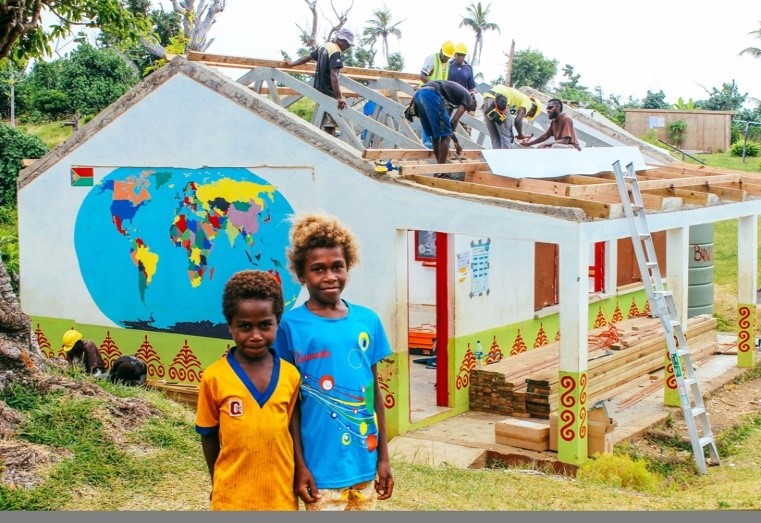Australia is committed to helping the people of Vanuatu meet the challenge of climate change.
At the 2016 Pacific Islands Forum, Prime Minister Turnbull announced a climate change and resilience support package to the Pacific of $300 million over four years. This is part of the $1 billion climate finance Australia pledged at the 2015 Paris climate change meeting to reduce emissions and build resilience in developing countries over five years.
To take action on climate change Australia's focus is on climate research and information, building resilience to climate change and disasters, and increasing country capacity to respond to disaster events. This support aligns with the Framework for Regional Development in the Pacific, endorsed by Pacific Island Forum leaders, which outlines an integrated approach to addressing climate change and disaster resilience. Australia also supports the objectives of Vanuatu's Climate Change and Disaster Risk Reduction Policy.
Key risks and challenges
Vanuatu is internationally recognised as one of the most vulnerable countries in the world to the impacts of climate change. With over 80 per cent of the population deriving their livelihoods from weather-sensitive industries (agriculture, fisheries and tourism), people are highly susceptible to changes in weather and climate.
ni-Vanuatu also have a high degree of resilience. They have built coping mechanisms - reinforced by strong kastom (cultural) traditions to deal with highly variable weather over centuries. This has enabled communities to prepare for, manage and recover from disasters.
The increasing impacts of climate change, however, are projected to erode coping capacity at community levels, threaten growth and critical infrastructure and undermine development gains. In many areas it is already doing so.
Opportunities
Despite the risks and vulnerabilities, there are opportunities in Vanuatu to build on strong existing community structures to increase resilience to climate change impacts.
The new National Sustainable Development Plan includes climate change as a cross-cutting issue. National climate change policies and strategies are also providing a solid basis for enhanced action and integration of climate change risks and resilience into core sectors.
Building the skills to increase resilience
Through the Vanuatu Skills for Economic Growth Program, Australia is providing skills training across a range of climate-relevant sectors.
For example, we are training people to design and construct cyclone resilient buildings, as well as providing vocational training in agriculture, fisheries and food preservation to improve food security and resilience in a changing climate.
Bilateral programs
Australia will provide over $16 million in bilateral climate change support to Vanuatu from 2015-16 to 2017-18.
Responding to a severe skills gap, the Skills for Economic Growth Program ($15.3 million 2016‑20) has highlighted climate change as a core focus for vocational training.
Following the destruction caused by Cyclone Pam in 2015, the Vanuatu Education Support Program ($39.5 million 2012-17) is re-building school facilities to withstand category 4-5 cyclones.
Australia's Aid Investment Plan for Vanuatu (2015-16 to 2018-19) includes a commitment to integrate climate change across all development sectors of the program, and to support increased productivity and sustainability in agriculture, fisheries and water through the Australian Centre for International Agricultural Research (ACIAR).
These sectors will remain key areas for integrating climate change into Australian assistance in future.
Regional programs
Vanuatu benefits from Australia's regional climate change programs, which total over $50 million (2015-16 to 2017-18).
Our programs work to:
- Build capacity of national meteorology services and measure sea level rise through the Climate and Oceans Support Program in the Pacific
- Improve access to and use of climate information for decision making and knowledge management through the iCLIM program
- Strengthen climate and disaster risk and resilience across key sectors, across four countries including Fiji, through the Pacific Risk
Resilience Program - Support the capacity of Pacific island countries, including Samoa, to access climate finance, through the German development organisation GIZ, and
- Provide technical support to integrate climate change across our programs.
These programs build on our long-term support for climate science in the Pacific.
Australia also provides support to the Pacific Regional Environment Programme (SPREP), whose mandate includes addressing priority climate change issues.
Global programs
Vanuatu further benefits from Australian global humanitarian and disaster risk reduction programs. The Australian Humanitarian Partnership works with civil society partners to help local communities and organisations to prepare for and respond to disasters ($50 million, 2017-22). Australia also contributes to global climate finance mechanisms, including the Green Climate Fund ($200 million committed over four years from 2015) and the Global Environment Facility ($93 million committed, 2014-15 to 2017-18). These funds support a wide range of resilience building and emissions reduction projects in the Pacific region.
Australia uses its seat on the Green Climate Fund Board and the Global Environment Facility Council to streamline processes, highlight the climate change challenges and vulnerability of Pacific island countries and advocate for Pacific focused proposals. In Vanuatu, the Green Climate Fund has approved a US$23 million project for climate information services to inform government planning and policies.

